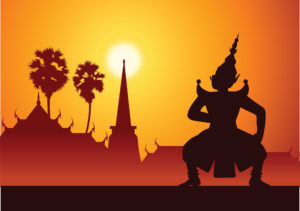
Viewers of the recently released “Black Panther” movie were treated to richness and beauty in the fictional kingdom of Wakanda. The film’s production and costume designers drew inspiration from many real-life African civilizations to create everything from clothing and weapons to the buildings and ritual customs. At the same time, some filmgoers were surprised to find a piece of Hindu religion woven into Wakandan culture. Hanuman, the gorilla god revered by M’Baku and his Jabari tribe in the movie, has a fascinating origin in India’s mythoi.
Sources Speculate About This Divine Primate
Several legends claim that a misshapen jaw is responsible for Hanuman’s simian-like appearance. One speculates that he mistook the sun for a fruit and tried to eat it, which prompted the thunder god, Indra, to strike the child on the jaw with a thunderbolt. Conversely, other texts insist Hanuman burned to a crisp when he attempted to bite into the sun. When the gods gathered his ashes and bone fragments to reconstruct him, they failed to find a missing piece of his jaw. Overall, his stories appear in several different Indian epic works:
- Ramayana
- The Mahabharata
- Rasavinoda
- The Puranas
These tales also differ on how the primate god’s birth happened. One version asserts that Anjara, his mother, was cursed by a monkey sage when she disrupted his meditation. After changing into a monkey, the sage told her to pray to Shiva so that she would give birth to one of his incarnations and break the curse. Later, Shiva was moved by Anjara’s devotion and asked the wind god, Vayu, to deliver food to her. Upon Anjara resuming human form, Vayu raised her child himself. Yet another tale insists that she fell in love with Kesari, a monkey-like forest dwelling king, and the two were rewarded with the child Hanuman after helping Shiva and his wife, Parvati, fight a demon.
Hanuman’s Heroism in Indian Epic Poetry
The Encyclopedia Britannica discloses that Hanuman plays a pivotal role in the mythology of Rama, one of Vishnu’s many avatars. The monkey deity provides aid by rescuing Rama’s wife, Sita, from a demon named Ravana, so he is remembered for this service and embodies the virtues of self-control, faith and heroism. BBC Religions reveals that his birth is celebrated in a yearly festival called “Hanuman Jayanti,” which incorporates prayers, worship ceremonies, food offerings and street processions.
How Did a Hindu God End Up in “Black Panther”?
Readers of the original Black Panther comics may remember the gorilla god Ghekre, whose White Gorilla cult was outlawed by the Black Panther cult. Yet the Jabari tribe and its leader M’Baku continued to revere Ghekre and chose to live in the mountains apart from other Wakandans. While the film’s creators have not yet explained why they reimaged Ghekre as Hanuman, it may have been part of an effort to transform racially insensitive imagery related to M’Baku in the original comics. Winston Duke, the actor who portrayed the character onscreen, addressed the Jabari’s Hanuman worship in a February 2018 Vanity Fair interview. Duke explained that Wakandan society has not been impacted by European colonialism, adding that the deity is “just who they pray to, and they find their strength and agency in this religion…being a bit gorilla-influenced was a sense of pride for them.”
Outside of Hinduism, Hanuman isn’t as well-known as other deities such as Shiva, Krishna or Kali. However, the monkey god has now gained a little bit more exposure thanks to Marvel’s early 2018 cinematic release. Is the Hanuman invoked by M’Baku and his tribe the same as the hero who saved Rama’s wife? The film doesn’t say, but it’s another example of how we humans continue to create and expand our mythologies.

